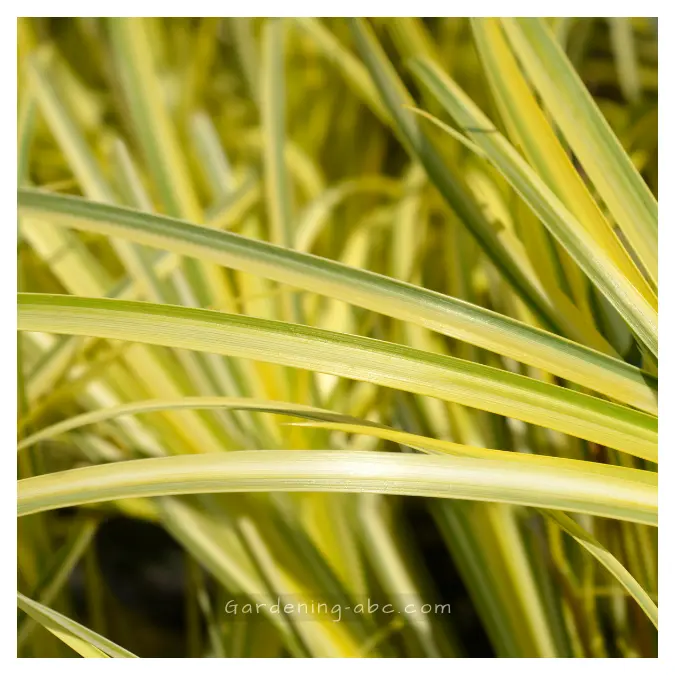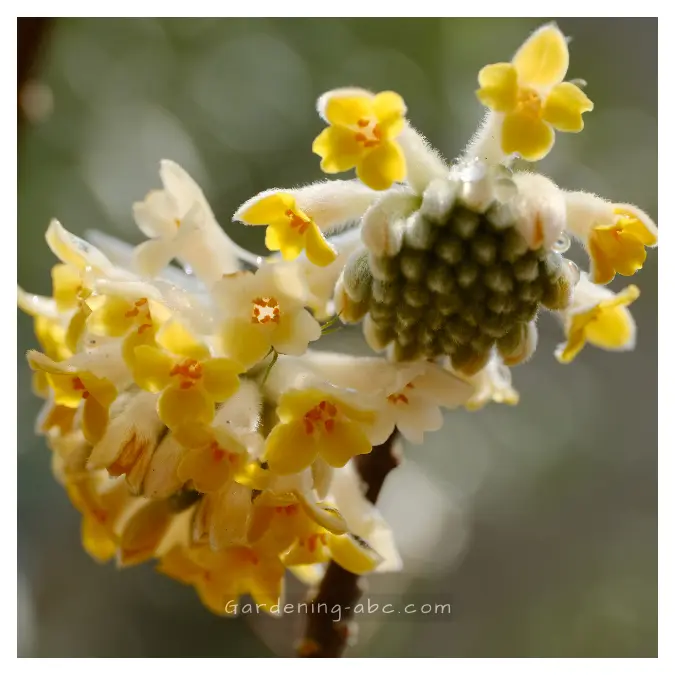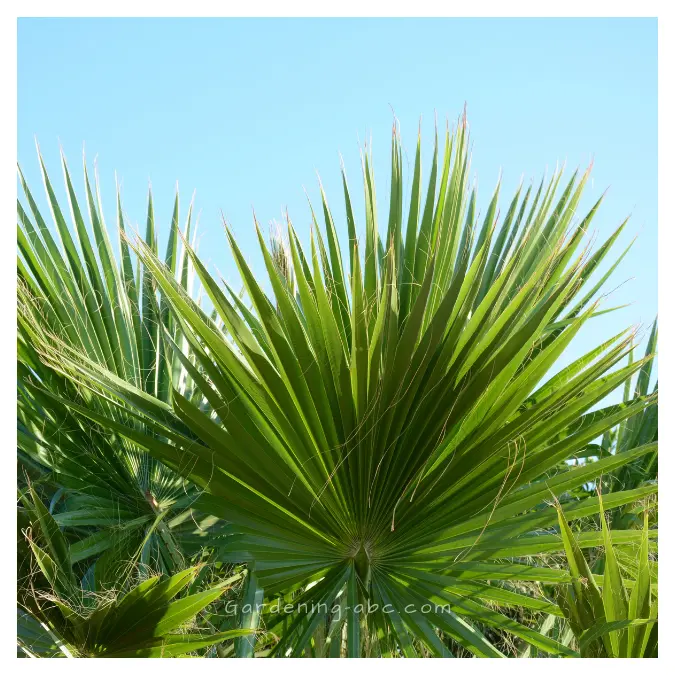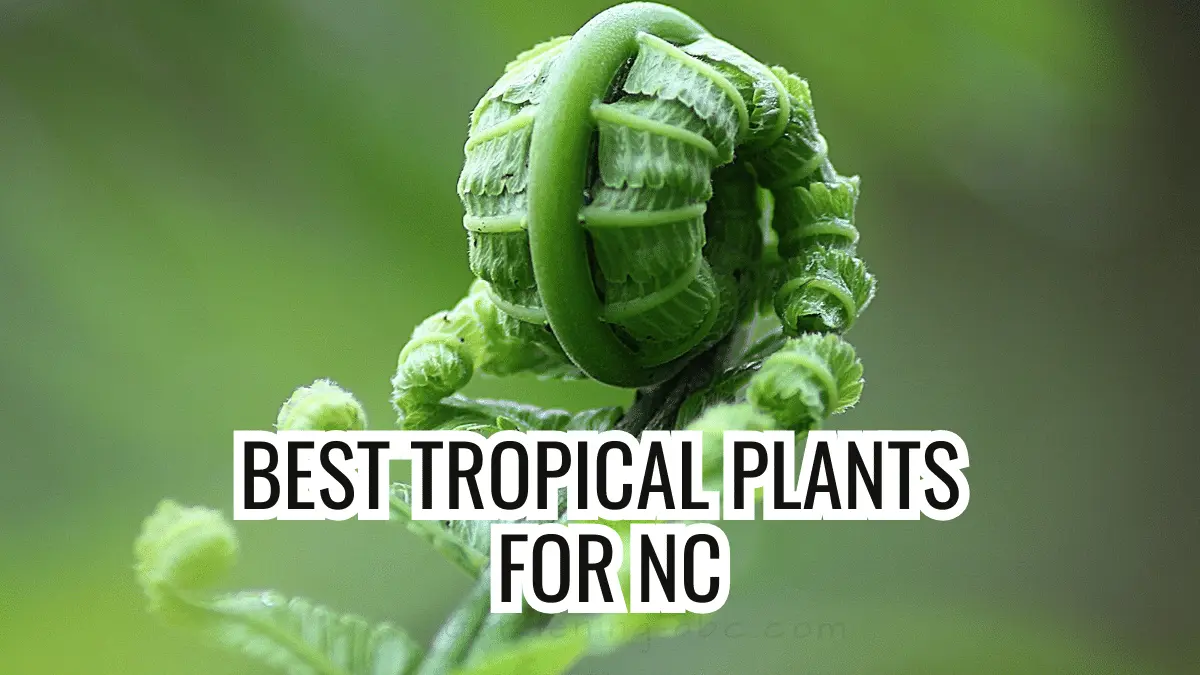We use affiliate links to run our site. When you buy through links on our site, we may earn an affiliate commission, without any added cost to you. Learn more
Escape to the tropics without leaving home! North Carolina’s warm humid climate allows gardeners to cultivate exotic beauties from around the world. Discover surprising tropical plants that thrive right here in NC.
With huge dramatic leaves, delicate lacy ferns, and intoxicating blooms, these tropical treasures will transport your landscape to paradise.
In this post, we will explore some of the best tropical plants that can be grown in North Carolina gardens and tips for helping them flourish. Read on to explore easy ways to add a tropical oasis to your own backyard!
Tropical Plants That Thrive in North Carolina
Many plants that are native to tropical regions can grow quite well in North Carolina if given the right care and conditions. Our subtropical climate allows gardeners to successfully grow exotic beauties that add a touch of the tropics to any garden.
Vigorous Ferns Bring the Rainforest Home
Ferns are excellent tropical plants that thrive in the shady and moist conditions found in many North Carolina gardens. Their lacy fronds create a graceful, rainforest feel.
The autumn fern is one of the most popular ferns in our area. This evergreen beauty keeps its frosty green color all year round. Autumn ferns like moist, shady sites, and their fine delicate textures pair well with bolder plants. Deer and rabbits tend to leave them alone too.
Exotic Flowers Brighten Shady Areas

Another excellent tropical plant for North Carolina is the fragrant flowers of the ogon sweetflag. This plant loves wet soils and brings a fine-textured golden flair to shady gardens and rain gardens. Their sweet floral fragrance is a treat. And Ogon sweetflag is also ignored by deer and rabbits.
Larger-than-life blooms can be enjoyed on plants like the elephant ear. The huge heart-shaped leaves make a dramatic statement in the garden. Their bold coarse textures contrast nicely with fine-leaved plants.
Elephant ears come in a variety of leaf colors like black, green, and purple. They tolerate both sun and shade. And deer and rabbits don’t find them appetizing.
Help tender tropicals thrive through North Carolina winters with a backyard greenhouse kit like this. Its humidity control, heating, and cooling systems give you complete command over the environment.
Large-leaved Shrubs Create a Tropical Look
Many large-leaved shrubs common to tropical regions also grow well in North Carolina. Their big bold leaves bring a tropical look to local gardens.
The fatsia is an evergreen shrub that can grow quite large in North Carolina. It produces big lobed leaves that can get over a foot wide! Fatsia thrives in shade and moist soils. Use it as a focal point or tropical screen.

For a heavenly winter fragrance, add the paperbush to your garden. This deciduous shrub blooms in late winter with incredibly fragrant blossoms. It also has pretty peeling bark and attractive autumn leaf color. Paperbrushes do well in part shade areas.
Gardenias are beloved for their intoxicating white summer blooms. The glossy evergreen leaves look neat and tidy all year long. Gardenias thrive in acidic, well-drained soil and part shade conditions. They make excellent foundation plantings.
Gardenias, camellias, and other acid-loving tropical plants grow their best when the soil pH is just right. Skip the backbreaking work of adding sulfur and lowering soil pH quickly with this liquid acidifier instead. Simple to use and effective, it’s the easy way to give acid-loving plants the soil conditions they require with minimal effort.
Tropical Trees That Thrive Here

Some trees that originate in tropical lands also grow well in our North Carolina climate. The windmill palm tree gives a tropical flair with its large fan-shaped leaves. It handles our winters quite well and slowly develops a single straight trunk.
Rose of Sharon is another small ornamental tree that blooms beautifully here. It flowers through much of summer with large hibiscus-like blooms. Rose of Sharon grows quickly and handles a variety of soil types and light conditions.
Caring for Tropical Plants in NC
While the plants listed above (and others from the tropics) can thrive in North Carolina, they do require some specialized care. Here are some tips for growing tropicals in NC:
- Provide consistent moisture – Tropical plants often require quite moist soil so mulch and water regularly, especially in dry spells. Group plants with similar needs.
- Give them shade – Bright indirect light is best for most tropicals. Shelter them from the hot afternoon sun.
- Choose the right location – Consider microclimates that may be warmer and more humid around bodies of water or on the south/east sides of buildings.
- Boost humidity – Increase humidity around tropical plants by grouping them together, using pebble trays, and misting foliage.
- Protect from winter wind – Shield tender tropicals from harsh winter winds which can dry and damage foliage.
- Add winter mulch – Mulch tender tropical plants to insulate roots and crowns from cold damage. Wait until the ground freezes to apply mulch.
- Monitor for pests – Tropical plants can be prone to pests; check for signs of problems and treat them promptly. Common pests include scales, mealybugs, and mites.
Conclusion:
Tropical plants can bring exotic beauty to gardens across North Carolina when given the right care. Try adding some of these tropical treasures to your own landscape.
Explore our site for more recommendations on plants that thrive in NC gardens. Share this post if you found it helpful.
And most importantly, get growing! A mini tropical paradise awaits right outside your door.
Amazon and the Amazon logo are trademarks of Amazon.com, Inc, or its affiliates.

Hi there! My name is Prasenjit and I’m an avid gardener and someone who has grown a passion for growing plants. From my hands-on experience, I have learned what works and what doesn’t. Here I share everything I have learned.
